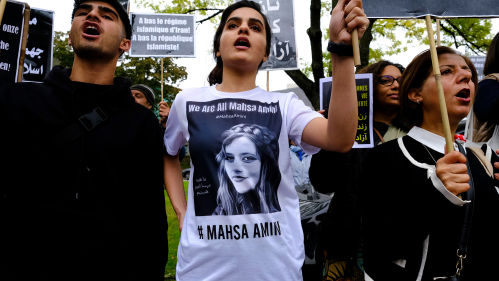Iranian Protests Watched Closely by Rutgers Community Wondering What Comes Next

Rutgers scholars are planning a panel discussion about the protests and the implications for the future of Iran
Protests in Iran sparked by the death of Mahsa Amini, who was arrested by the morality police for not properly wearing a head covering, are continuing into their second month as Rutgers faculty with ties to the country anxiously watch events unfold.
The unrest has passed the 40-day mark, a symbolic end to a period of mourning over Amini’s death. It has lasted longer than many of the protests held over the last decade with dissent spreading around the globe.
The movement has also brought together different groups in Iranian society, says Maryam Borjian, professor in Rutgers-New Brunswick’s Department of African, Middle Eastern and South Asian Languages and Literature in the School of Arts and Sciences, who was born and raised in Iran.
The continuing civil disobedience is raising questions about what might be different this time as there is no sign of the conflict ending. Amini was a member of the Kurdish population, one of Iran’s most oppressed ethnic minorities.
“Through social media, though tightly controlled in Iran by the authorities, the youth in Iran have seen how their peers in other parts of the world are having a normal life, including having the right to choose what to wear without being harassed, arrested or even killed by morality policy,’’ she said. "This generation is a global generation who longs for a normal life, but this normal life is not an option in Iran."
Borjian is one of several Rutgers scholars, either born in Iran or first-generation Americans with close ties to the country, who are not certain what the outcome will be for the protestors driven by a desire for regime change.
Given the lack of opportunities – economic, social, professional, personal – Gen Z thinks it has little to lose. That’s why they are more radical and angrier than their reform-minded predecessors.
Neda Bolourchi
Since Amini’s death on Sept. 16, students at Rutgers and at universities throughout the country have held vigils to honor her memory and support Iranian protestors. Rutgers scholars are also planning a virtual panel discussion on Thursday, Nov. 10, at 5 p.m., sponsored by the Center for Middle Eastern Studies in the School of Arts and Sciences and Rutgers Global.
“These protesters have demonstrated tremendous courage and a deep desire to enjoy the rights and freedoms that Americans too often take for granted,” said President Jonathan Holloway, who has sent notes of support to Rutgers students from Iran. “No one should have to suffer violence at the hands of their own government simply for expressing their views and calling for change.”
The people who have taken to the streets in Iran are largely part of Gen Z, whose oldest members are 25. They are a tech-savvy group who have been able to circumvent the walls built to keep them ignorant and uniformed, and they used and continue trying to use platforms like WhatsApp, Signal, Skype and Instagram, says Neda Bolourchi, associate director of the Center for Middle Eastern Studies in the School of Arts and Sciences.
While reform has historically been the goal in the past, today this group of young people wants more, Bolourchi recently said during a virtual panel before UN Women, a United Nations entity dedicated to gender equality and the empowerment of women.
The protestors are demanding to at least rid the country of the practice of mandatory hijab, workplace discrimination against women and a woman’s lack of rights in marriage, Bolourchi says, noting they want fundamental rights. The protests are different than past movements because they are women-led and cross class lines.
The ultimate goal for many protestors, she says, is revolution and government overthrow.
“Given the lack of opportunities – economic, social, professional, personal – Gen Z thinks it has little to lose,” says Bolourchi, who teaches courses on political violence, revolution, Islamic law and human rights. “That’s why they are more radical and angrier than their reform-minded predecessors.”
Afrooz Mosallaeipour, a doctoral student in media studies in the School of Communication and Information, who was born in Iran and is in the United States on a student visa, says it is clear that the protests are about more than head coverings.
Led by women and supported by men, working class, middle class and more elites than in the past, the movement is strong, she says, because people understand that there is too much oppression of women in Iran and it needs to end.
“The morality police say it is about my hair showing,” says Mosallaeipour, who recently was part of a virtual panel, "Women, Life and Freedom," at the University of Texas to discuss the news reporting on the protests and death of Amini. “Protestors are saying it’s about bodily autonomy and women’s basic human rights and they are right. We need to stop this some time and now seems to be the right time.”
Ava Majlesi, director of Rutgers’ Center for Critical Intelligence Studies and associate director of the Miller Center on Community Protection and Resilience whose parents immigrated to the United States, calls protestors “brave and courageous” but worries that the outcome will not lead to the change that Iranians and others are protesting and dying over, including children.
She remembers a childhood visit to see family in Iran when she was warned about a two-inch gap between her overcoat and socks, a violation of Iran’s strict dress code for women. The encounter that she recalls today serves as a chilling window into the treatment women face in her ancestral home.
“The government, including the Islamic Revolutionary Guard Corps, which is tasked with defending the Islamic Republic against all threats, is ready to do whatever is necessary to quash this, whether it means torture or death,” Majlesi says. “Although I am cautiously optimistic, I can’t say this will lead to the toppling of the regime.”


